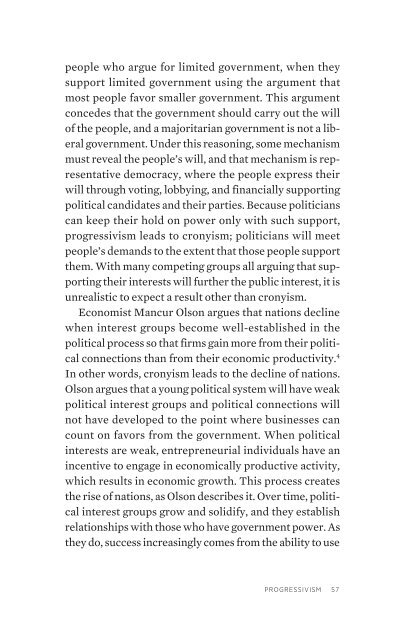url?sa=t&source=web&cd=1&ved=0CCYQFjAA&url=http://mercatus.org/sites/default/files/Holcombe_Cronyism_web
url?sa=t&source=web&cd=1&ved=0CCYQFjAA&url=http://mercatus.org/sites/default/files/Holcombe_Cronyism_web
url?sa=t&source=web&cd=1&ved=0CCYQFjAA&url=http://mercatus.org/sites/default/files/Holcombe_Cronyism_web
Create successful ePaper yourself
Turn your PDF publications into a flip-book with our unique Google optimized e-Paper software.
people who argue for limited government, when they<br />
support limited government using the argument that<br />
most people favor smaller government. This argument<br />
concedes that the government should carry out the will<br />
of the people, and a majoritarian government is not a liberal<br />
government. Under this reasoning, some mechanism<br />
must reveal the people’s will, and that mechanism is representative<br />
democracy, where the people express their<br />
will through voting, lobbying, and financially supporting<br />
political candidates and their parties. Because politicians<br />
can keep their hold on power only with such support,<br />
progressivism leads to cronyism; politicians will meet<br />
people’s demands to the extent that those people support<br />
them. With many competing groups all arguing that supporting<br />
their interests will further the public interest, it is<br />
unrealistic to expect a result other than cronyism.<br />
Economist Mancur Olson argues that nations decline<br />
when interest groups become well-established in the<br />
political process so that firms gain more from their political<br />
connections than from their economic productivity. 4<br />
In other words, cronyism leads to the decline of nations.<br />
Olson argues that a young political system will have weak<br />
political interest groups and political connections will<br />
not have developed to the point where businesses can<br />
count on favors from the government. When political<br />
interests are weak, entrepreneurial individuals have an<br />
incentive to engage in economically productive activity,<br />
which results in economic growth. This process creates<br />
the rise of nations, as Olson describes it. Over time, political<br />
interest groups grow and solidify, and they establish<br />
relationships with those who have government power. As<br />
they do, success increasingly comes from the ability to use<br />
PROGRESSIVISM 57


